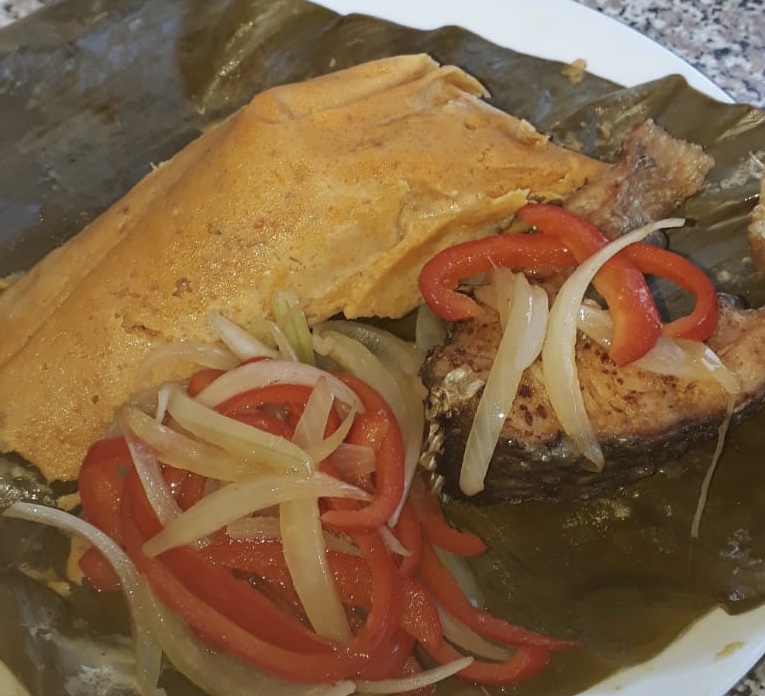
In my last article, I covered Celebration, and as a confirmed foodie, I promised to do one on food. Although I did not start liking food until I was about 13 years old, I still loved the idea of food. However, the focus of this article is on African Britishness with respect to my life as a foodie and my experience with hawkers in ghetto Lagos.
After sitting down to analyse this, I realised that I carry a wealth of knowledge. On the outside, I would always be seen as a Black British or African British, or how anyone wants to term it. On the contrary, I know that everything that we are and would ever be is already within us. God declared it, and I believe it.
I feel it is just connecting with Him and pushing the right buttons. Of course, this is not to say that you don’t have to strive and nurture before you can bloom into who you are.
Let me explain. I believe the mixed upbringing I had as a child made me what I am. I grew up with my grandmother in my most creative and formative years. And now I imagine she must have found my incessant curiosity and need to experience everything challenging.

Childhood
While my parents were in England enduring being black or African British, my grandmother looked after my brother and I. As an only child, she had many half-sisters whom she ensured she saw regularly.
We lived in Lagos, and for those who know Lagos in South West Nigeria, it is a bustling cosmopolitan hotspot of migrants, professionals, expatriates, etc.
By the way, AfrAsia Bank and the New World Wealth (NWW) report on Africa Wealth in 2018 ranked Lagos as the 4th wealthiest city in Africa, behind Cairo, Johannesburg and Cape Town.
When I examined some Asian cities like Tokyo, Shanghai and others like New York, London, etc., I discovered semblance of Lagos City about them. I consider Peckham in London, for example, a mini Lagos, full of black and African British people.
Peckham
In fact, I discovered a hidden gem like a mini Nigerian restaurant in Peckham known as Lolak. There you can eat the best soups with pounded yam and Amala. It has no frills or airs. You are served with a steaming mound of pounded yam or Amala and a massive bowl of soup, all for under £10!

Amala and Okro soup at Lolak – Photo by Stella Ahmadou
Lagos, Nigeria
Incredibly, there are about 250 indigenous languages spoken in Nigeria. Out of these languages, three of them are considered amajor languages (Yoruba, Hausa and Igbo), as they enjoy wider range of users. The Yoruba language, for example, is the mainly used one in Lagos.
However, Lagos as a city is filled with a composite lifestyle of rich versus poor, and clean versus dirty, depending on the side of the divide you encounter. It equally smells, is full of thieves, hawkers and kidnappers, and has a thriving Silicon valley. This is not to say that there are no honest, hardworking people in Lagos, as it is clearly the commercial centre of modern Nigeria. It definitely cannot be compared with the Black British experience in the UK.
Lagos lacks electricity(which explains why it mostly runs on generators like most Nigerian cities), water and housing. It is also filled with shanty towns that sprout every few days and are almost immediately squashed by the government. It was formerly the capital of Nigeria before it was moved to the clinically clean Abuja.
The residents of Lagos, whom we call Lagosians, cannot imagine living anywhere else.
Well, I lived in Lagos till the age of 9 before I was whisked to a boring middle-class life in the City of Benin.
My grandmother’s favourite half-sister lived in inner part of Lagos which you could almost call a ghetto, but because my grandmother loved her sister, we spent most of our time with her.
This meant that I experienced what would be called ghetto Lagos firsthand. What a joy!

Dad’s Reaction to my Experience
On a visit of my dad to Nigeria one time, the way I showed off my versatile knowledge of the nooks and crannies of rough Lagos, and my mispronounced spoken English horrified him. I think that hastened his return home!
I absolutely loved my grandmother who sadly passed away when I was 11. Yes, that was a couple of years after I left her to live with my parents. It was really a painful period for me.
Lagosians Perception of Food
I know that so far I have not even discussed food here. It is coming.
So my earliest memory of being a foodie was about the age of 5. In most ghetto habitation, there is always a set-up of food and drinks.
The Lagosians, by the way, are so busy surviving in this melting pot of hours of traffic jams and dodging the thieves and pickpockets. They also try to escape not dying in the mass transportation, a small ‘death traps’ known as Danfo. Thus, they do not cook!

You heard me. Most cooking is done for celebrations and by the middle class and the rich. Even those ones tend to buy food. I do not mean sandwiches but steaming hot rice, goat meat, ayamase stew, boli and peanuts for lunch (roasted plantain), suya, Edikainko, etc. Why cook when you can have breakfast, lunch and dinner out on the street!
My Early Life as a Foodie
I digress again; forgive me. It was an exciting time of my life, and I am just happy sharing it with you. If memory serves me right, there was a woman right in front of my great aunt’s house that sold rice and stew from 2 huge pots, which sell out very quickly.
I begged my grandmother to let me help out and sell. Yes, the woman allowed me, and I sold bowls of rice to hungry Lagosians who were amused at this precocious 5-year-old. I took it very seriously, and to some, I was generous, and to others, I gave smaller portions. She gently corrected it, but that was my first adventure in buying and selling, and I loved the jingle of coins in my hand!
Perhaps this has changed, but when I grew up, fresh and clean meat came straight from the abattoir and had to be sold on the day. You buy your chicken live from the market and kill it in your backyard. Everything we ate was fresh and organic. I am not sure of these days of snail and fish farming.
Hawkers
Hawkers of food started from about 5 a.m. each day to catch early morning workers, and the best food was gone by 8 a.m. Each hawker sang out their wares in high lilting tones that were unique to them. There was a particular hawker that sold rice and stew and whose food I have never eaten anywhere else. Her food was so delicious that if you did not come out to buy your bowl early, it would be finished. She was also very strict and never sold beyond what she hawked each morning.

Another magical experience were the night markets which I pass by each day on my way home from school. There is wide-held belief that ghosts and spirits came to sell their wares to unwitting customers at night, but who knows.
Revaluation of African Culture
My favourites of the late Anthony Bourdain episodes were ones where he travelled to Asia, South America and Africa. I do still think in regret on how he ended his life. For Anthony Bourdain , food was a backdrop to the politics and culture of the countries. He was brave and crazy. Simply, I do not know if there would ever be anyone like him.
I am determined to visit as many of those places as I can. I do believe that the food scene is changing fast in Britain, as black or African British millennials are waking up and embracing their culture. You have the chance to explore new tastes in the food scene. Grab it!

